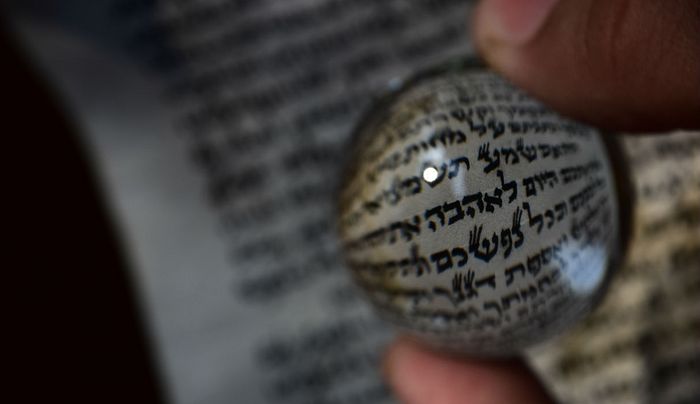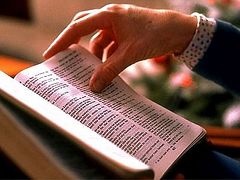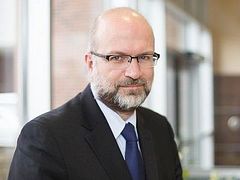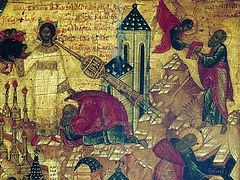The question of what Orthodox Christians should make of Protestant biblical scholarship is a complicated question. First off, what do I mean by "Protestant biblical scholarship"? I don't mean to limit this to the work of scholars who are actually Protestants -- I include any scholar who takes the approach to Scripture that Protestant scholars developed, whether they be Roman Catholics, Jews, or Atheists. Should we embrace it fully, reject it completely, or should we make use it to some extent -- but critically, and cautiously?
The Problems with Embracing it Fully
A key question to consider at the beginning here is whether Protestants discovered an approach to Scripture, beginning in the 17th century, which is essential to properly understanding the Scriptures? If this were true, that would mean that for most of Church history, people were not really able to to properly understand the Scriptures. And that is an assumption which no right-believing Orthodox Christian could possibly accept.
When speaking about Protestants in general, it is necessary to make generalizations that are not going to be true to the same extent in every case, but generally modern Protestant biblical scholarship attempts to do the same thing with interpreting Scripture that Protestants attempt to do with Church history. They assume the Church became corrupt over the course of its history, and so it is necessary to leapfrog over the centuries and reestablish (more or less) the early Church. When it it comes to interpreting the Bible, they argue that we have to make that same leap, and get back to the understanding that prevailed when the Scriptures were written, in order to properly understand them. But the problem is, absent a time machine, we can only go back to the first century, in a sense, via the living Tradition that connects us with that time and with the apostles and saints of that time.
How do we know what St. John meant in his Gospel? We of course start with the text, but we then look to those whom he taught, and then to the Church as whole which received his teachings, and preserved them. We do not believe that the connection we have with St. John and the preservation of his teachings is either tenuous, or only partially reliable -- we believe the Church to be an infallible guide to what St. John meant.
Protestant scholars approach the Gospel of John like a crime scene investigation, or an archaeological dig, where they have to piece together fragmentary evidence, and then try to put together some sort of a plausible hypothesis about what to make of it. This, however, would only be true, if the Scriptures were not really the inspired word of God, and if the Church was not really the pillar and ground of the Truth. The Church understands the Scriptures because it knows the authors, and it is guided by the ultimate author of the Scriptures -- the Holy Spirit.
We also have to understand that Protestant methods are not neutral "technologies." They are methods that come with theological assumptions... assumptions which we generally do not share. If they were neutral technologies we should expect to see consistent results from their use, but in fact what we see is that they are used to produce speculative and subjective scholarship that is all over the map -- the likes of which would make the most speculative Freudian psychoanalysts blush, and shame the worst Gnostics the Church has ever encountered in its history.
But some might suggest that surely no Orthodox Christian would just accept this kind of scholarship, whole-hog, but such people would be wrong. Fr. Paul Tarazi is a case in point. If you look, for example, at the first volume of his three part introduction to the Old Testament, you will find that his entire text is based upon the assumption that the JEDP theory is a fact. Part one of the text is entitled "The Yahwist Epic" (the "J" source, which ends with an excursus entitled "The Case of the Elohist" (the "E" source); part 2 is entitled "The Deuteronomistic Tradition (the "D" source); part 3 is entitled "The Priestly Writings (the "P" source); and part 4 is entitled "The Post-Exilic Historical Traditions (which discusses the final redaction of the four sources into the Pentateuch as we know it). Fr. Paul does not present the JEDP theory as a theory, or discuss its merits. You would never know that any serious scholars questioned it. He simply assumes it to be true, and analyzes the separate histories and theological perspectives of the four sources. A good protestant introduction to the Old Testament generally does a better job of laying out the various theories, and they do discuss their merits and demerits. In fact, Brevard Childs (a Yale Old Testament Scholar, who was a Protestant) comes closer to an Orthodox presentation of the question, because in the end, he argues that we should interpret the Pentateuch as a whole, in its canonical form, not as separated sources (see his Introduction to the Old Testament as Scripture (1979).
Is it possible that the Pentateuch was comprised of more than one source? It is possible. Is there any way that we could confidently know which source was which in the Pentateuch, given the information available to us today? No. But even if we knew for sure that the Pentateuch was composed of four sources, and even if we could confidently identify which source any particular portions of the Pentateuch came from, if we believe in God, and believe that the Scriptures are inspired by Him, and have confidence that the form that we have received is the form that God intended for us to receive, then the form we have receive is what we should concern ourselves with.
But as a matter of fact, as is often the case, Protestant scholars selectively choose the "facts" and "evidence" that suit their agenda and then proceed, with their conclusions essentially predetermined by their basic assumptions, to apply their methods to the Scriptures. And so if you assume, for example, that any mentions of liturgical worship would be later than the time of Moses (because you're a Protestant, and see that as a later corruption), and obviously, the work of later priests, your starting assumption is how you identify the "P" source, and then you know the "P" source, because it matches your assumptions. The reasoning is circular, but because it is presented with confidence, by people who sound like they know what they are talking about, people too often assume there is something objective and compelling about it, when in fact, it is completely subjective.
The Problems with Rejecting it Completely
Having said that Protestants did not discover anything new that is essential to properly understanding the Scriptures, the fact remains, we live in a world in which the fruits of Protestant biblical scholarship are everywhere. If we could establish an isolated community on an island somewhere, completely disconnected from the rest of the world, such a community could afford to ignore this scholarship... but that is not the world we live in.
One fairly obvious reason we should want to understand this field is that if we want to reach Protestants, we have to be able to communicate with them in ways that will be meaningful to them. We have to understand where they are coming from, and be able to answer their questions. We should not only be able to identify where they deviate from the Orthodox Faith, but also to acknowledge where they do not.
What is not usually obvious, however, is that even Orthodox people who live in the west have been heavily influenced by this kind of scholarship, and they more often than not do not realize it, or recognize where so many of their assumptions about Scripture come from. Even though we live in a culture that is becoming increasingly anti-Christian, it is nonetheless a culture that is immersed in Protestantism. Our people watch documentaries, read articles, or have teachers or professors who make appeals to biblical scholarship, and often what is presented in the name of biblical scholarship is in fact a fairly radical set of conclusions that are not even in the mainstream, but because someone with a Ph.D. is quoted, the assumption is that this is what people who are educated on the subject ought to think. And so if you have a parish priest who has not critically studied Protestant biblical scholarship, he may not recognize how his flock has been influenced by it, much less recognize its influence upon himself, nor will he be equipped to give convincing answers when people ask him if it is really true that the Gospel of Judas is a reliable text, or why we should accept the testimony of the canonical Gospels, or even how we know that Christ was even an historical person.
And as a matter of fact, the enemies of the Church are not unaware of this scholarship. For example, we have a letter Maxim Gorky wrote to Joseph Stalin, in which he discussed his strategies for eliminating religious faith in Russia, and among many other things, he said:
"We cannot do without an edition of the "Bible" with critical commentaries from the Tubingen school and books on criticism of biblical texts, which could bring a very useful "confusion into the minds" of believers" (Letter of Gorky to Stalin).
The liberal German biblical scholarship Gorky refers to may very well have played a role in his own atheism. If it did not cause him to become an atheist, it certainly did nothing but confirm him in that atheism.
Making Medicines from Poisonous Snakes
The Church Fathers obviously didn't have to contend with liberal German biblical scholars, but they did have to contend with an issue that has some analogies to this question -- and that is the question of what use, if any, Christians should make of pagan Greek learning. In the wider culture, pagan Greek philosophy, rhetoric, and literature was the intellectual gold standard, and to educated people of the time, you either were conversant in these things, or you were not to be taken seriously.
On the one hand, you had those like Tertullian, who dismissed Greek philosophy by asking: "What indeed has Athens to do with Jerusalem? What concord is there between the Academy and the Church?" (Prescription against Heretics, Chapter 7). And on the other hand, you had those, those who adopted Greek philosophy in such a way that they ended up with a pagan faith with only a thin Christian veneer. Tertullian's extremism lead him out of the Church; and most of those who fully embraced pagan philosophy belonged to heretical groups that never were in the Church to begin with.
The Church Fathers, however, took a balanced approach. For example, St. Gregory the Theologian wrote:
"...as we have compounded healthful drugs from certain of the reptiles; so from secular literature we have received principles of enquiry and speculation, while we have rejected their idolatry, terror, and pit of destruction. Nay, even these have aided us in our religion, by our perception of the contrast between what is worse and what is better, and by gaining strength for our doctrine from the weakness of theirs" (Oration 43, Panegyric on Saint Basil," A Selected Library of the Nicene and Post-Nicene Fathers of the Christian Church, series 2, vol. vii, eds. Henry Wace and Philip Schaff (New York: Christian, 18871900), p. 398f).
Likewise, St. Basil the Great said:
"Now, then, altogether after the manner of bees must we use these writings, for the bees do not visit all the flowers without discrimination, nor indeed do they seek to carry away entire those upon which they light, but rather, having taken so much as is adapted to their needs, they let the rest go. So we, if wise, shall take from heathen books whatever befits us and is allied to the truth, and shall pass over the rest. And just as in culling roses we avoid the thorns, from such writings as these we will gather everything useful, and guard against the noxious. So, from the very beginning, we must examine each of their teachings, to harmonize it with our ultimate purpose, according to the Doric proverb, 'testing each stone by the measuring-line''" (Address to Young Men on the Right Use of Greek Literature, IV).
Simply put, we eat the meat, but spit out the bones. Use what is useful to us and to our purposes, and reject what is not. The appropriation of terminology and useful elements of Greek philosophy is already evident in the writings of the Apostles in the New Testament, and so what the Fathers did was entirely in keeping with the Faith that they had received from the Apostles. But the criterion of where to draw the lines here has always remained the Faith once delivered unto the Saints (Jude 3).
We should approach Protestant biblical scholarship in precisely the same way.
Taking a Critical Approach to Biblical Criticism
The key to approaching this scholarship in order to make good use of it, without falling prey to its pretensions, is to apply the same "hermeneutic of suspicion" to Protestant biblical scholarship, which its practitioners so love to apply to Scripture. As, Thomas Oden observed
"Scripture criticism is more firmly captive today to its modern (naturalistic, narcissistic, individualistic) Zeitgeist than Augustinianism ever was to Platonism or Thomism to Aristotelianism. Trapped in modern prejudices against pre-modern forms of consciousness, reductionistic exegesis has proved to be just as prone to speculation as were the extremist forms of Gnosticism and as uncritical of its own presuppositions as supralapsarian Protestant scholasticism" (Agenda for Theology: After Modernity What? (Grand Rapids: Zondervan, 1990) p. 111).
“We violate a primary ethical demand upon historical study if we impose upon a set of documents presuppositions congenial to us and then borrow from the canonical prestige of the documents by claiming that it corresponds with our favored predisposition. That lacks honesty. The modern attempt to study Christ has done this repeatedly. The text has often become a mirror of ideological interest: Kant’s Christ becomes a strained exposition of the categorical imperative; Hegel’s Christ looks like a shadow-image of the Hegelian dialectic. Schleiermacher’s Christ is a reflection of the awkward mating of pietism and romanticism; Strauss’s Christ is neatly weeded of all supernatural referents. Harnack’s portrait of Christ looks exactly like that of a late nineteenth-century German liberal idealist; and Tillich’s Christ is a dehistorical existential idea of being that participates in estrangement without being estranged…. The historical biblical critic was “not nearly so interested in being changed by his reading of the Bible, as in changing the way that the Bible was read in order to confirm it to the modern spirit”” (The Word of Life: Systematic Theology Volume Two, (New York: Harper & Row, 1989), p. 224f).
"Historical biblical criticism has been allied with polemical concerns since its eighteenth century inception as an ideological agent of "Enlightenment." It has expressed a determined interest from the beginning in discrediting not merely the authority of Scripture, but authority in general -- all authority as such. Just read the biographies of Reimarus, Rousseau, Lessing, Strauss, Feuerbach, and of course Nietzsche (cf. Jacques Derrida, The Ear of the Other). It has operated especially as a partisan "ideology for the demystification of religious tradition"... It is astutely described as the strike force of modernity, "the Wehrmacht of the liberal Church"... The hermeneutic of suspicion has been safely applied to the history of Jesus but not to the history of the historians. It is now time for the tables to turn. The hermeneutic of suspicion must be fairly and prudently applied to the critical movement itself... One obvious neglected arena is the social location of the quasi-Marxist critics of the social location of classic Christianity, who hold comfortable chairs in rutted, tenured tracks. These writers have focused upon the analysis of the social location of the writers and interpreters of Scripture. Yet that principle awaits now to be turned upon the social prejudices of the "knowledge elite" -- a guild of scholars asserting their interest in the privileged setting of the modern university" (Ibid., p. 225f).
Whenever you read a claim by a modern biblical scholar that seems questionable -- question it. Ask how he knows what he claims to know? What actual hard evidence does he have? Usually, you will find the actual evidence is very slender, and the rest is filled in with speculation and wishful thinking. And it is often the case that you will find that bad scholarship of that sort is refuted by better, more conservative Protestant scholars. Even with those scholars, you have to be discerning, but it should be understood that not all of these scholars are equally wrong-headed, or equally hostile to the Traditional understanding of the Scriptures which we hold to.
I would also add that it is not just for apologetic purposes that we need to be familiar with this kind of scholarship -- there are some good and useful things that these scholars have produced over the centuries. For example, until there is a good Orthodox Bible dictionary that is available in English, there is no reason we should not make use of such handy resources that helps a reader figure out who is who, and what is what as they read through the Bible. Why should we not make use of a good Greek or Hebrew Lexicon, even if those who compiled it were not Orthodox? As a matter of fact, there is no translation of the Bible in English that is not either entirely the work of non-Orthodox scholars, or at least dependent upon their work to some extent. It would be foolish, and practically impossible to make no use of heterodox scholarship when studying the Scriptures.
As Clement of Alexandria put it, we can take the spoils of Egypt and turn them into the furniture of the Tabernacle. That requires that we do not simply import pagan furniture into the Church, but whatever is true and good can be put to good use in the Church, and this is true of Protestant scholarship as well. We simply have to be discerning, and to remain faithful to the Tradition of the Church in the process.
Orthodox Biblical Interpretation and Protestant Biblical Scholarship





Hello Afanassy, what you are asking for is another article. And what I am talking about is not really a translational question, it has to do with how you interpret the text. I have an essay on translations, which may be of interest to you, but it is a different issue. http://www.saintjonah.org/articles/translations.htm
Broadly speaking, one example, which I do refer to is the focus Protestant scholars have on identifying and dissecting alleged sources in a text. They expend a huge amount of time and energy on this, in the Pentateuch, when the focus should be on the text we actually have, not on hypothetically reconstructed original texts.
Please Bless....
To make this discussion perhaps more concrete, it would be helpful if you chose for us three specific (3) examples, --- quoted by book, chapter, and verse --- in the NASB New Testament, in which the "crime-scene Investigation" methods (textual criticism) of Protestants has produced a significantly different (or perhaps even erroneous) meaning; --- or perhaps a meaning that is oversimplified and superficial. Please also include any NASB footnotes as part of the Protestant interpretation. (I am designating the NASB because of its reputation for accuracy.)
Thank you..
=====
I have an Orthodox acquaintance (Greek, cradle) who started reading protestant writings (especially on end-times), and it is changing her Orthodoxy. At this point she seldom attends Divine Liturgy. It takes a certain amount of prelest to think one has sufficient "discernment" to dive into this stuff and emerge unharmed. I respect Fr John and wish he had not left out instruction on the work required to develop--and maintain--this discerning Orthodox mind.